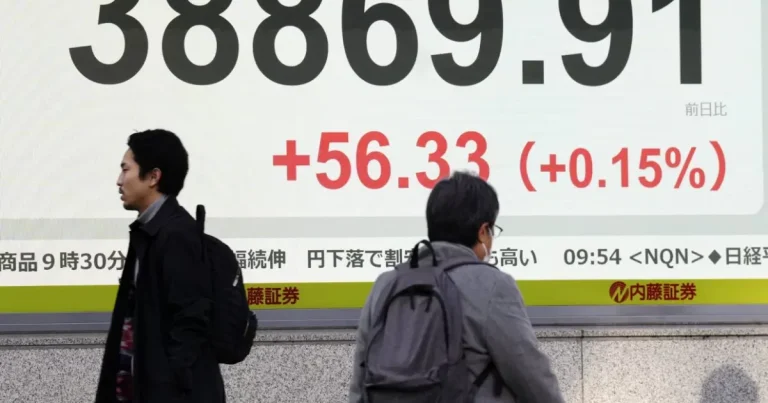Asian and European markets sank Monday after an outsized US jobs report dealt another blow to hopes for more interest rate cuts, while oil extended a rally sparked by new sanctions on Russia’s energy sector.
The equity sell-off tracked hefty losses on Wall Street, where all three main indexes finished more than one per cent lower as the new trading year continued to falter.
Keenly awaited data on Friday showed the US economy created 256,000 jobs last month, a jump from November’s revised 212,000 and smashing forecasts of 150,000-160,000.
The figures followed news that the crucial US services sector picked up in December, with the prices component soaring more than expected to the highest level since last January, while another report showed job openings hit a six-month high in November.
Hopes that the Federal Reserve will continue cutting rates through 2025 — having made three trims last year — were dashed when in December it indicated just two reductions over the next 12 months, down from four tipped previously.
The hawkish pivot came as inflation continues to hover above the bank’s two percent target, while there are also concerns that president-elect Donald Trump’s plans to slash taxes, regulations and immigration will reignite prices.
“Given a resilient labour market, we now think the Fed cutting cycle is over,” said Bank of America’s Aditya Bhave and other economists.
“Inflation is stuck above target: in the December (summary of economic projections), the Fed not only marked up its base case for 2025 significantly, but also indicated that inflation risks were skewed to the upside. Economic activity is robust.
“We see little reason for additional easing.”
Markets in Sydney, Singapore, Seoul, Mumbai, Taipei, Manila, Bangkok and Jakarta all sank. Tokyo was closed for a holiday.
Hong Kong and Shanghai also fell but pared initial losses as data showed Chinese exports and imports topped forecasts in December.
London, Paris and Frankfurt fell at the open.
On currency markets the pound was wallowing around lows not seen since the end of 2023 owing to fading hopes for US rate cuts as well as worries about the British economy. The euro struggled at its weakest since November 2022.
Surging oil prices added to unease, with both main contracts jumping more than percent — extending Friday’s gains of more than three percent — after the United States and Britain announced new sanctions against Russia’s energy sector, including oil giant Gazprom Neft.
However, commentators do not expect prices to spike too much, even amid speculation that Trump will hit Iran with fresh sanctions.
“A significant and perhaps underpriced risk to crude oil prices is the potential for supply to outstrip demand, especially given OPEC+’s intention to reintroduce barrels to the market,” said Stephen Innes at SPI Asset Management.
“Even if US sanctions curtail Iranian oil production by 1.5 million barrels a day — a scenario similar to that during Trump’s previous presidency — this amount could easily be compensated by OPEC+, which is currently holding back 5.8 million barrels a day, or 5.3 percent of the total global production capacity.”
However, he added that some issues could lead crude to rocket, including an escalation of the Middle East crisis, a significant reduction in Russian output or exports and a strategic about-face by OPEC+ to slash production.
– Key figures around 0815 GMT –
Hong Kong – Hang Seng Index: DOWN 1.0 percent at 18,874.14
Shanghai – Composite: DOWN 0.3 percent at 3,160.76 (close)
London – FTSE 100: DOWN 0.3 percent at 8,224.50
Tokyo – Nikkei 225: Closed for a holiday
Euro/dollar: DOWN at $1.0216 from $1.0244 on Friday
Pound/dollar: DOWN at $1.2140 from $1.2210
Dollar/yen: DOWN at 157.39 yen from 157.74 yen
Euro/pound: UP at 84.17 pence from 83.90 pence
West Texas Intermediate: UP 1.5 percent at $77.75 per barrel
Brent North Sea Crude: UP 1.4 percent at $80.86 per barrel
New York – Dow: DOWN 1.6 percent at 41,938.45 (close)
AFP
